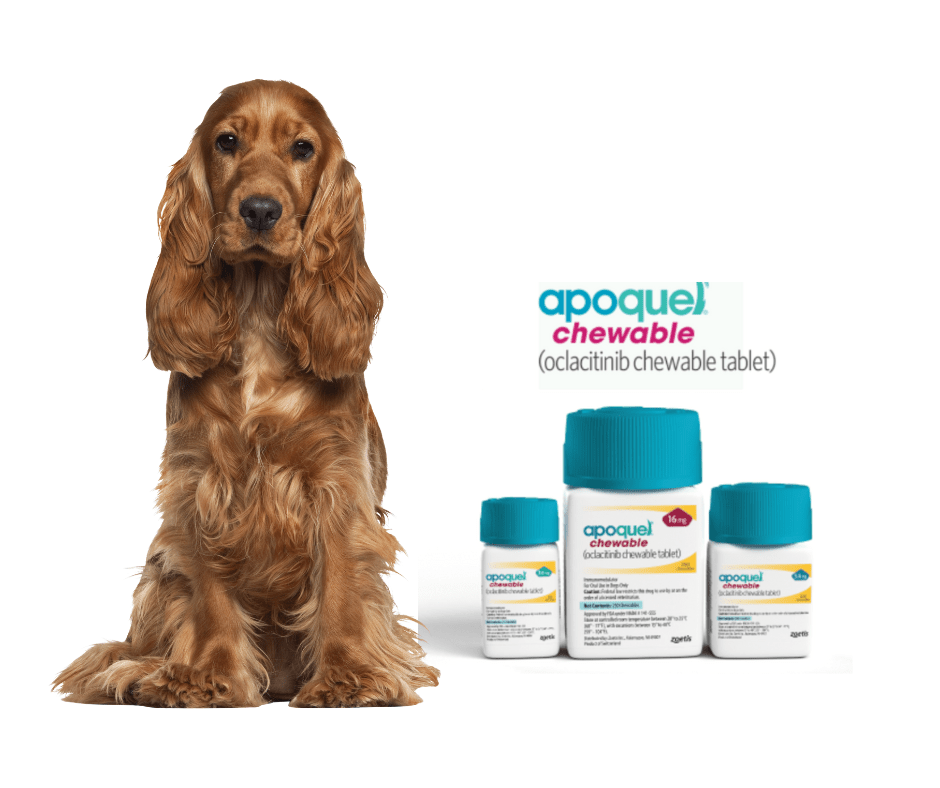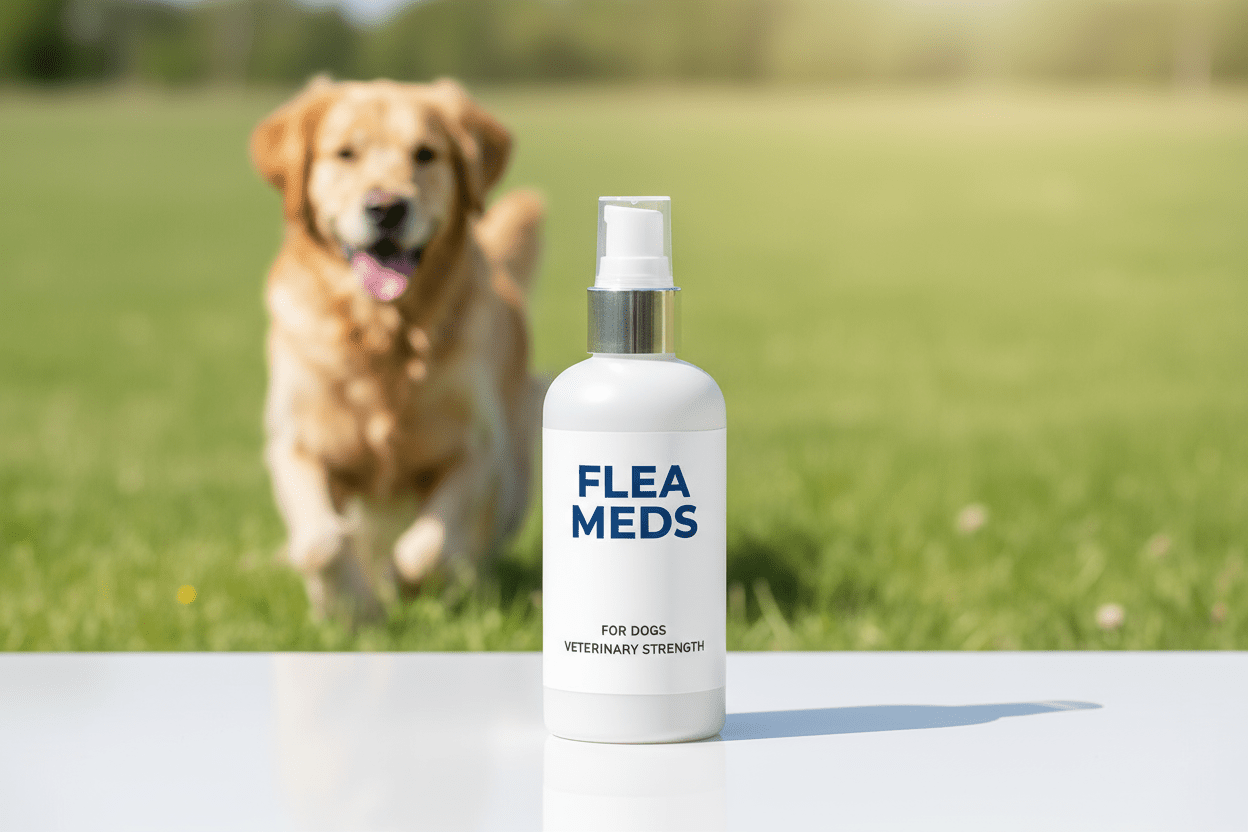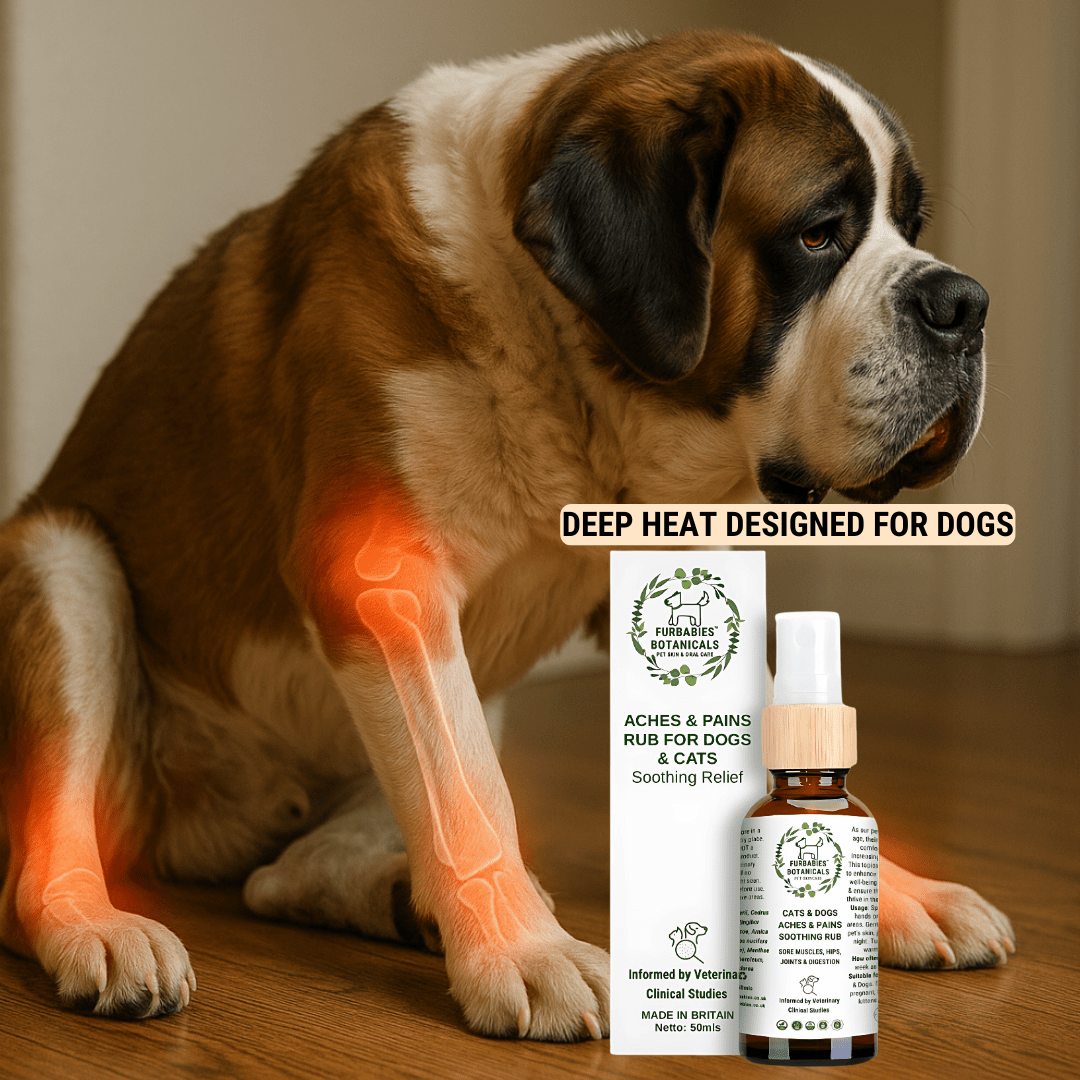In this comprehensive guide, we will address all your common questions about Apoquel, its side effects, usage, alternatives, and how to safely incorporate it into your dog’s treatment plan.
What is Oclacitinib (Apoquel)?
Oclacitinib is an oral medication used to treat itching associated with allergic skin conditions in dogs. It works by inhibiting Janus kinases (JAKs), enzymes that play a key role in the inflammatory process. By blocking these enzymes, Apoquel reduces inflammation and alleviates the symptoms of itching, redness, and discomfort.
Apoquel is commonly prescribed for conditions such as:
- Atopic dermatitis
- Allergic skin reactions
- Pruritus (itching)
- Flea allergy dermatitis
How to Safely Monitor Your Dog on Apoquel
Prolonged use of Apoquel requires careful monitoring to prevent potential complications. Regular check-ups and blood tests are necessary to assess how the medication is affecting your dog's health.
Suggested Blood Work Monitoring for Dogs on Apoquel:
| Blood Parameter | Purpose of Monitoring | What to Look For |
|---|---|---|
| Complete Blood Count (CBC) | To assess overall blood health, immune system function, and organ impact |
WBC (White Blood Cell Count): Look for signs of infection or immune suppression. RBC (Red Blood Cell Count): Check for anemia or signs of infection. Platelets: Assess for thrombocytopenia (low platelet count). |
| Liver Enzymes (ALT, ALP) | To monitor for liver damage, which can be a concern with prolonged Apoquel use. | Look for elevated liver enzymes, indicating possible liver stress or damage. |
| Kidney Function (BUN, Creatinine) | To monitor kidney function, especially in long-term use. | Elevated BUN (blood urea nitrogen) or creatinine may indicate kidney issues. |
| Serum Chemistry (Albumin, Globulin) | To evaluate protein levels and overall organ function. | Abnormal protein levels may suggest systemic issues. |
| Electrolytes (Na+, K+, Cl-) | To monitor fluid balance and kidney function. | Abnormal electrolyte levels can indicate dehydration or kidney stress. |
| Urinalysis | To assess kidney function and detect infections, particularly urinary tract infections. | Look for signs of infection, crystals, or kidney dysfunction. |
| Fecal Occult Blood | To check for gastrointestinal bleeding, a rare but possible side effect of Apoquel. | Presence of blood in feces could indicate digestive system problems. |
| Thyroid Hormones (T4, TSH) | To monitor for any thyroid imbalances that may be exacerbated by the immune-modulating effects. | Abnormal thyroid levels could suggest hormonal issues. |
Key Monitoring Areas:
- WBC (White Blood Cells): Reduced WBC counts may indicate an increased risk of infections, as Apoquel can suppress the immune system.
- RBC (Red Blood Cells): A drop in RBCs can indicate anemia or bone marrow suppression, which can be caused by long-term medication use.
- Liver Function: Monitoring liver enzymes (ALT, ALP) is crucial since Apoquel is metabolized by the liver and can cause liver stress or damage.
- Kidney Function: Given the risk of kidney issues with prolonged Apoquel use, creatinine and BUN levels should be regularly monitored.
Regular blood work should be done periodically to ensure your dog’s health and mitigate potential risks associated with the immune-modulating effects of Apoquel. If you notice any changes in your dog’s condition or symptoms, notify your vet immediately for further evaluation.
What are the side effects of Oclacitinib for dogs?
The most common side effects include vomiting, diarrhoea, decreased appetite, and lethargy. Serious side effects can include increased susceptibility to infections, potential cancer risks, and liver or kidney damage with long-term use.
Common and Serious Side Effects of Oclacitinib for Dogs
Common Side Effects
While Apoquel is effective, it is not without side effects. Some dogs may experience mild, transient effects when starting treatment.
- Vomiting
- Diarrhoea
- Decreased appetite
- Lethargy
- Skin infections: Dogs on Apoquel may be more prone to developing secondary infections, such as bacterial or fungal infections, especially if used for long durations.
Serious Side Effects
In addition to common side effects, there are more serious risks associated with Apoquel that pet owners need to be aware of, especially with long-term use.
-
Increased Susceptibility to Infections: Since Apoquel suppresses the immune system, dogs may be more susceptible to infections, including bacterial, viral, and fungal infections. Regular monitoring is crucial to catch infections early.
-
Exacerbation of Neoplastic (Cancerous) Conditions: Apoquel can suppress the immune system, which may hinder a dog's ability to detect and fight abnormal cell growth, potentially increasing the risk of tumour development. Although no definitive link has been proven, caution is advised, especially for dogs with pre-existing conditions.
-
Organ Effects (Liver and Kidney): Long-term use of Apoquel may affect liver and kidney function. Blood tests are essential to monitor for potential changes in liver and kidney parameters.
-
Severe Reactions in Certain Dogs: Dogs predisposed to conditions like liver disease or chronic infections may experience severe side effects. If your dog has a compromised immune system, or if the medication is not properly monitored, reactions can be more severe (see the adverse events below)
Adverse Events
These are the effects that have been observed in clinical studies or post-market usage:
Very Common (>1 animal / 10 animals treated):
- Pyoderma
- Skin lump
- Papilloma
Common (1 to 10 animals / 100 animals treated):
- Lethargy
- Lipoma
- Polydipsia (increased thirst)
- Increased appetite
- Nausea
- Vomiting
- Diarrhoea
- Anorexia
- Histiocytoma (a type of skin tumor)
- Fungal skin infection
- Pododermatitis (inflammation of the feet)
- Otitis (ear infection)
- Lymphadenopathy (swollen lymph nodes)
- Cystitis (bladder infection)
- Aggression
Other Adverse Events (including isolated reports):
- Anaemia
- Lymphoma
- Convulsion (seizure)
Can I buy Apoquel without a vet prescription?
No, Apoquel requires a prescription from a licensed veterinarian, as it’s a controlled medication that should be administered under professional guidance.
How much does Apoquel cost in the UK?
The cost of Apoquel varies based on dosage and where you purchase it. On average, you can expect to pay between £60 to £120 for a month’s supply. Prices may differ depending on the veterinary clinic or online pharmacy.
How long can a dog be on Apoquel?
The duration a dog can be on Apoquel depends on the individual case and the vet's recommendations. It is typically used for short to medium-term management of allergies, but some dogs may need long-term use. Regular monitoring is essential.
Is it bad for dogs to be on Apoquel?
It depends on a case by case basis. Apoquel is can be safe when used under veterinary supervision, but long-term use can increase the risk of infections and organ damage. Always follow your vet’s guidelines and ensure regular check-ups. The the table above for side effects and adverse events.
Is there a safer alternative to Apoquel for dogs?
Alternatives to Apoquel include other medications such as cyclosporine (Atopica) or steroids (prednisone) but again this depends on your dog's specific clinical presentation. Consult with your vet dermatologist to decide on various options.
Skin Barrier Repair Serums as an Alternative:
In addition to the conventional pharmaceutical and natural alternatives, another effective option for supporting your dog's skin health is skin barrier repair. Our DermaRenew and DermaProtect Skin Repair Serums are designed to assist in the skin recovery process, promoting healing and providing relief from irritation.
-
DermaRenew Serum: Formulated with lavender, carrot seed oil, and other natural ingredients, this serum helps soothe inflamed skin while promoting cellular regeneration. Lavender is well-known for its calming properties, while carrot seed oil helps rejuvenate damaged skin, reducing dryness and irritation.
-
DermaProtect Serum: This serum contains rose, calendula, and clary sage, ingredients known for their anti-inflammatory and healing effects. Calendula is particularly effective in reducing redness and promoting skin repair, while clary sage aids in calming sensitive, inflamed skin.
Both serums work by reinforcing the skin’s natural barrier, which is essential for protecting the skin from further irritants and allergens. By improving the skin's moisture retention and strengthening its outer layers, these serums help reduce the frequency of flare-ups, prevent infections, and support overall skin health.
Why Choose Skin Barrier Repair Serums?
- Natural and Safe: Our serums use eco-friendly, plant-based ingredients that are safe for pets, especially those with sensitive skin or those prone to allergic reactions.
- Promote Long-Term Healing: Unlike medications that may suppress symptoms temporarily, these serums focus on repairing and strengthening the skin barrier, offering long-term benefits for skin health.
- Support for Chronic Conditions: Dogs with ongoing skin issues, such as allergic dermatitis or dry, irritated skin, can greatly benefit from the nourishing properties of these serums, as they help manage chronic conditions and reduce the frequency of flare-ups.
Can you skip a day of Apoquel?
If you miss a dose of Apoquel, it's important not to double up the next day. Instead, administer the missed dose as soon as possible, or consult your vet for further advice.
Why wash hands after touching Apoquel?
Apoquel is a hazardous drug, and it's recommended to wash your hands thoroughly after touching the medication, especially if you are handling tablets, to avoid any risk of contamination or side effects.
Would we recommend Apoquel?
Oclacitinib (Apoquel) can be a valuable treatment for managing allergic skin conditions and pruritus (itchiness) in dogs. However, as with any medication, Apoquel comes with its potential risks, particularly when used long-term. Side effects, including increased susceptibility to infections, organ impacts, and exacerbation of pre-existing conditions like dermatitis, make it crucial to monitor your dog closely while on treatment.
The adverse event profile, including skin infections, gastrointestinal issues, and occurrences like lymphoma or convulsions, warrants careful consideration. Long-term use of Apoquel can also raise concerns about the potential worsening of dermatitis or the development of other skin-related complications. This makes Apoquel a less favorable option for dogs with chronic or severe skin conditions that could be aggravated by immune suppression.
In light of these considerations, Apoquel should be considered as a treatment option primarily when the benefits of managing severe itching and allergic reactions outweigh the risks, particularly in cases where other treatments have failed or are less effective. It is essential to work closely with your veterinarian to assess your dog’s specific condition and ensure that Apoquel is the right choice for their treatment plan.
For those looking for alternatives, especially for long-term skin health, incorporating natural treatments such as skin barrier repair serums like DermaRenew and DermaProtect can be a complementary or alternative approach. These serums help repair the skin barrier, support overall skin health, and offer a gentler solution for pets suffering from allergic dermatitis.
Ultimately, every dog is unique, and the decision to use Apoquel should be based on a thorough discussion with your veterinarian, taking into account your dog's health status, the severity of their condition, and the potential side effects.
References
- Papich, M. G. (2016). Veterinary Drug Handbook. 9th ed. Wiley-Blackwell.
- Clifford, C. A., & Gorman, N. T. (2018). Immunosuppressive therapy in veterinary dermatology: A review of commonly used immunosuppressive drugs in the treatment of canine allergic dermatitis. Journal of Veterinary Dermatology, 29(3), 202-211.
- American Veterinary Medical Association. (2018). Apoquel (Oclacitinib). AVMA. Retrieved from https://www.avma.org.
- Apoquel Information Leaflet: https://www.vmd.defra.gov.uk/productinformationdatabase/files/QRD_Documents/QRD-Auth_2222779.PDF














Share:
Is Cytopoint the Best Choice for Your Dog's Itchy Skin? A Comprehensive Guide
Can Fleas Live in a House Without Pets?